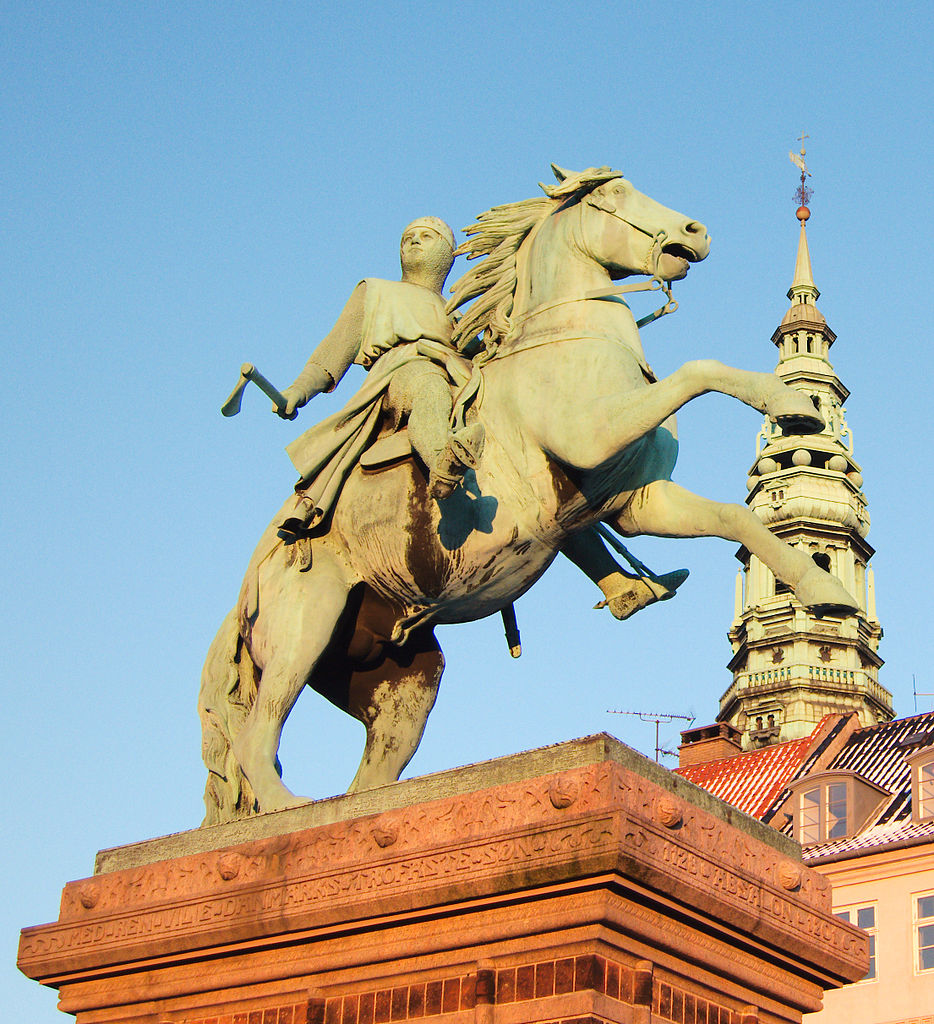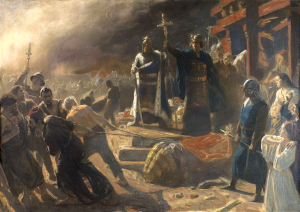
Name: Absalon
Tagline: Born into a famous Danish family, he became a powerful bishop and ally to the king.
Claim to Fame: Founded Copenhagen. Also, he paid the guy who wrote the first history of Denmark
Absalon was born into the important Danish Hvide family, from a mother who was a daughter of the Swedish king. But as the younger of two twins, he was destined to join the church while his brother, Esben Snare, took over the estates.
Absalon and Esben grew up with a third boy, their foster brother Valdemar. Valdemar would grow up to be king of Denmark, relying on both of the twins for support throughout his reign.
In 1146, Absalon was absent from a civil war in the country while he was studying theology at the university in Paris. He may well have been the first Dane to attend the university.
Eleven years later, in 1157, Valdemar ascended to the throne, and in 1158, he helped elect Absalon to the post of Bishop in Roskilde.
Foremost on Absalon’s agenda was the fight against the Wends. Not only were they pirates, and a terrible scourge to large parts of Denmark. They were also heathens! At first, Absalon created a protective fleet and built a number of defences, including a castle in what would become the city of Copenhagen. But later on, he had the conflict declared a crusade, and then he dragged the king along on a great war against the Wends on the island of Rügen.
Now our main source to a lot of this is the Gesto Danorum, a work written by a guy called Saxo Gramatticus – who, when he wasn’t writing on his history of Denmark, was a secretary to the Bishop of Roskilde. Yes, I’m talking about Absalon. So take the following with a grain of salt. However, the story has it that Absalon took charge on the battlefield. The king would meekly ask Absalon for guidance, and at one point, the king stayed in his bed while Absalon led the attack.
And the attack was successful! The Danes conquered the city of Ankona. Then Absalon had the statue of the Wendish god, Svantevit, dragged down and destroyed. The Danes then continued to the city of Charenza. But the Wends there surrendered when they saw Absalon and the Danish army. Absalon entered the city with the bishop of Aarhus and twelve men, passing by 6000 Wendish soldiers on their way to the temple in the centre of the city. There they found the statue of the seven headed deity, Rügievit. Absalon commanded the Danes to drag down the statue – and when the Wends saw how powerless their god was, they converted to Christianity in droves.

Then they went to the second great temple in the city, to the god Porevit, who had four faces, and a fifth in his chest. Absalon wanted him burned, but the inhabitants were afraid the fire would spread, and requested that the god be moved outside of the city. Absalon then demanded that the Wends move it themselves, and when he was burned.
Rügen was then incorporated into Absalon’s domain, and several churches were built there.
Wends were not the only targets of Absalon’s fighting skill. He fought a number of battles, ending with a great victory over a Pomeranian fleet attacking his vassal, Prince Jaromir of Rügen.
Absalon did a number of other things, including winning independence for Denmark from the Holy Roman Emperor and ascending to the archbishopric in Lund (while maintaining his post as Bishop of Roskilde). In the end, he left the fleets and armies in the care of the heir to the throne, Duke Valdemar, and the Bishopric of Roskilde to his nephew. Then he retired to the monastery in Sorø for his final years.
How would I use him: You want a high level cleric? Take a look at Absalon. He is at once a warrior, a priest, a bureaucrat and a lord. I could also see him as the basis for other kinds of characters in fantasy stories, or maybe as the basis for a character in Dark Ages Vampire, or even just regular Vampire.
He is also a powerful reminder of the power of words, and the importance of reading your sources with a critical mindset. How many of these stories are actually true? I wonder.